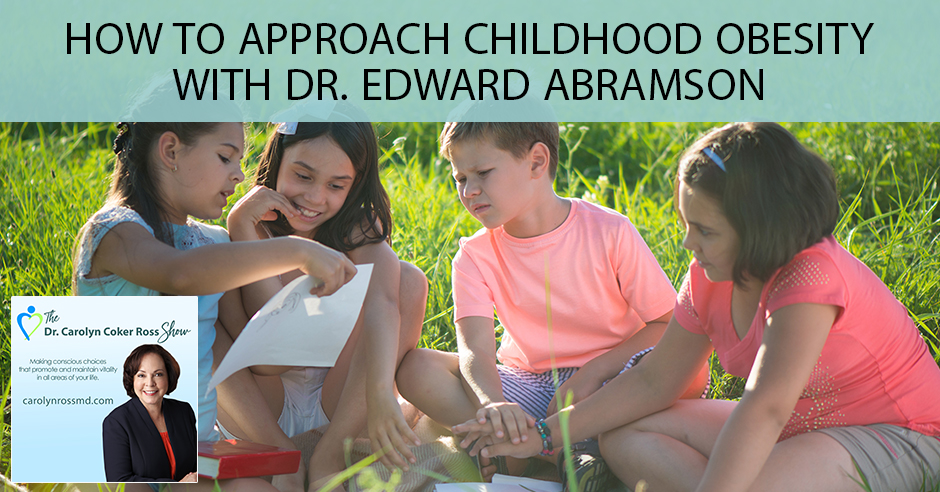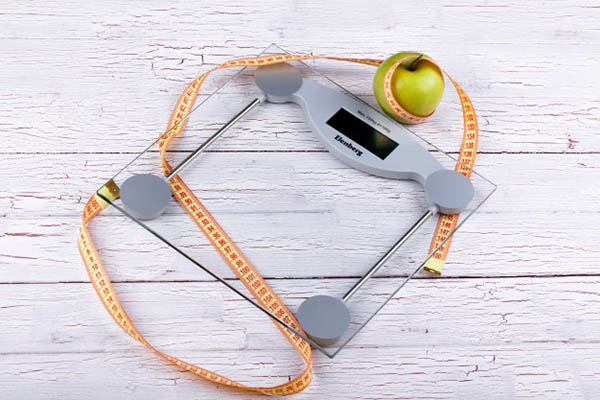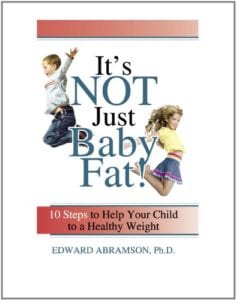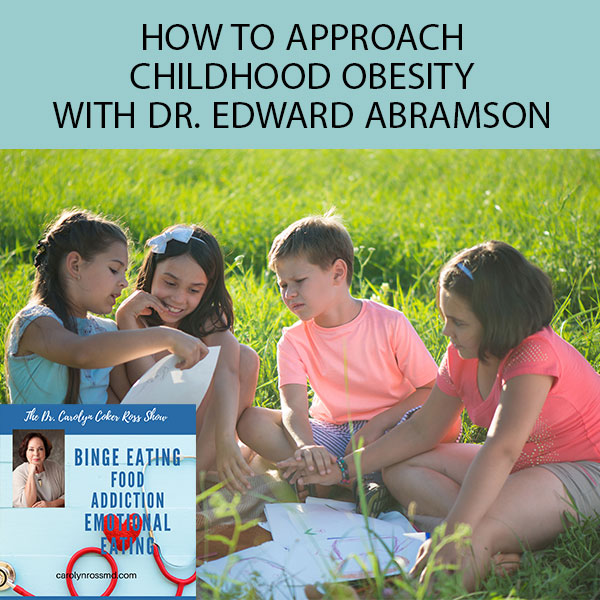
—
Listen to the podcast here:
How To Approach Childhood Obesity with Dr. Edward Abramson
Our guest is Dr. Edward Abramson who is an internationally-recognized expert on eating and weight problems. His book is It’s Not Just Baby Fat!: 10 Steps To Help Your Child to a Healthy Weight. This book shows parents how they can encourage healthy eating. It also helps their kids break away from the TV and video games while promoting a positive body image. He is a Professor Emeritus of Psychology at California State University and the former Director of the Eating Disorders Center at Chico Community Hospital. Dr. Abramson is a clinical psychologist who has worked extensively with parents concerned about their children’s eating and weight. He is the author of five books and 25 scientific publications. Welcome to the show, Dr. Abramson.
Thanks for having me on, Dr. Ross. I appreciate it.
You’re welcome. As everybody knows childhood obesity is a big focus in our country along with adult obesity. It’s something that we don’t know exactly how best to deal with. Most adults have been on diets to deal with their weight problem. You’re saying that children who are overweight or obese shouldn’t be put on a diet. Why is this?
There’s ample evidence that it backfires. One study that was done in Northern California followed high school girls from the first year of high school through the end of graduation. They matched them for weight. The girls who were on a diet gained more weight than equally heavy girls who weren’t dieting. Dieting presents all sorts of difficulties for kids. It is not the best way of approaching a child’s weight problem.
Many parents feel that they have to do something. Sometimes parents aren’t exactly sure whether their child is overweight or getting ready to go through a growth spurt. How can you tell the difference?
[bctt tweet=”Children who are overweight or obese shouldn’t be put on a diet.” username=”CarolynCRossMD”]Many parents don’t recognize when their kids are overweight. It’s not an easy judgment because kids grow at different rates. It may be that a child is going to have a growth spurt later. The best way of doing it and it’s not fool-proof is the Centers for Disease Control. It has a website which enables the parent to put in the child’s age specifically in months, the child’s height and the child’s weight. It will calculate what the BMI is for the child at that age and then determine what percentile that child is at compared with other kids of the same age. It’s typically defined as being obese if the child is at the 96th percentile for his age or higher. If the child is somewhere between 85 to 95 percentiles, then that’s thought of as being at risk for being overweight. If you had to try and calculate that yourself, it would be difficult. Fortunately, the CDC has a website that will do all the calculations for you.
It can be confusing. I always tell a story when I talk on my speaking circuit about having three sons. All three of them would have been described as chunky or husky and buying husky clothes at some point in their life usually around thirteen and fourteen. Somewhere in that neighborhood, they all looked plump. Lo and behold the following year, every single one of them went through growth spurts. Two cases went from about 5’2” tall to over 6’ tall and thin and muscular. Had I become concerned and started trying to get them to a diet, that would have been the wrong thing to do. It wouldn’t have helped and it may have hurt. I know in your book, and you and I both work in the eating disorder field, you talked about how many of these attempts to get children to lose weight can lead to eating disorders or the use of extreme methods for dieting.
It’s particularly risky when mom is concerned about her own weight and has a history of going on diet, joining Weight Watchers or taking some of the pills to try and lose weight. She becomes concerned that her daughter looks a little chunky and she decides that the two of them should diet together. They swap diets or go to a program together and that sometimes can cause problems. If you look at the history of young women with eating disorders, frequently there’s a connection between moms dieting, moms concerned about weight and their own maladaptive eating behaviors.
I noticed that many parents don’t feel that they don’t understand or recognize that their comments about their own body affect their children as well.
If mom is looking in the mirror and making negative comments about her body or constantly asking, “Does this make my butt look big?” or other kinds of concerns like that. What she’s doing is modeling a negative body image for her daughter. Her daughter then will start looking and saying, “Does this make my butt look big?” When teenagers especially become concerned about their weight then they sometimes resort to extreme measures for controlling their weight, which is unhealthy.

Childhood Obesity: If you look at the history of young women with eating disorders, frequently there’s a connection between moms dieting and moms concerned about weight.
Many parents do have valid concerns and one of them is that we know that there’s a lot of fatphobia in our culture. There’s quite a bit of stigma against people who are overweight or obese. They also know that their kids may get teased or bullied at school because of their weight or size. How do you handle these valid concerns that parents have, for example, about kids getting bullied at school?
That is a tragedy. Sometimes kids who are being bullied or picked on because of their weight feel embarrassed and humiliated that they might not even tell their parents that this is going on. A parent can ask an open-ended question, “How are things in school?” or something along those lines and listen to what the child is saying. Observe if the child is tending to withdraw because if a kid is being bullied, then he or she is likely to pull away from other kids. It’s helpful to discuss it with a child and you can help your child deal with it. One of the obvious things is to not respond if a child is being teased and then cries, gets angry or whatever. That reinforces the bully who’s doing the teasing. It’s not tattling to tell a trusted adult what’s going on. A child could, for instance, tell the teacher that she’s being subjected to humiliation in class. It’s helpful for parents sometimes to encourage the child to get involved in other after-school activities. Join the Girl Scouts, Boy Scouts or a church group because kids who are bullied or teased frequently withdraw and then they tend to eat more. If the parent can help facilitate social interaction with the child, that would be beneficial.
One of the things that happen with bullying is that it does affect the child’s self-esteem and how they feel about themselves in their body. Another thing that helps is to have a parent who doesn’t focus at all on appearance but talks about other things that the kid is good at or good qualities that they have. It helps them to build their self-esteem in that way.
One of the things that happen with eating disorders frequently is that anything that is negative going on and typically in a girl’s life, she then attributes to the fact that she’s too heavy or something along those lines. We do want to emphasize that life is more than appearance or weight.
I always tell my eating disorder patients that body image concerns are never about their body. They are a distraction from whatever else is going on in their lives. I wanted to talk about a question that I get or a comment that I get from parents all the time when I speak on this topic. They feel that they are depriving their kids when their kids are not allowed to have “goodies or treats” that the other kids have or get to eat at a junk food place or eat fast food. They feel it in some way that they are depriving their children. How do you address that concern?
[bctt tweet=”Many parents aren’t exactly sure whether their child is overweight or just going through a growth spurt.” username=”CarolynCRossMD”]That’s a valid concern. If all of his friends are stopping on the way home from school to have a Slurpee, what’s the child supposed to do? The message that we want to communicate with our kids is not never but rather on occasion. Rather than say, “This is a bad food that we never eat,” say, “This is something that we reserve for occasional treats.” If everybody else is having a Slurpee, you can have a Slurpee. Maybe cut back later on in the day.
How do you define the difference between a treat and regular foods? Some parents feel that their kids should get treated every day with the milk and cookies after school deal.
It’s helpful to recognize that snacking is fine. If the child has lunch at 12:00 and dinner isn’t until 7:00, he or she is going to need a snack sometime in the middle of the afternoon. A snack is different from a treat. A treat is a food that you eat purely for an enjoyment. A snack is something that you eat because you’re physically hungry. It’s perfectly okay to have fruit when you come home from school or nuts are particularly good. They keep you feeling full longer or some other relatively low-calorie snack. Save the cookies for dessert, for instance, as a treat. It’s also helpful if you’re going to be eating those high-calorie treats to eat them when you’re not hungry because then you’re less likely to binge on them.
I’m here with my guest Dr. Ed Abramson who is a well-known expert on eating and weight problems. He has appeared on many national TV shows including ABC News 20/20 with Sarah Ferguson, the Duchess of York. He’s also been interviewed on more than 50 TV and radio programs including Hard Copy, Good Day LA, Mornings On 2 and The Joan Rivers Show. He’s the author of the book, It’s Not Just Baby Fat!: 10 Steps To Help Your Child to a Healthy Weight. You can learn more about Dr. Abramson and his books on www.DrEdAbramson.com. I like in your book how you talked about how you think of foods like traffic lights. I wonder if you could share that with our audience.
That’s not original. I can’t claim credit for that. For younger kids, it’s helpful to talk about red lights, yellow lights, and green lights. Green lights are foods that are not calorically dense. This would typically be fruits and vegetables, beans, lean chicken, fish, etc. Yellow foods or yellow light foods are foods that are high in nutritional value but are calorically dense. We would put some limits on cheeses, red meats, things along those lines. The red-light foods are foods that are calorically dense but don’t have a lot of nutritional value. Here are the typical junk foods, Ding Dongs, Ho Hos, etc.

Childhood Obesity: We don’t have to use the word “dieting” but rather we can talk about healthy eating.
What do you think is the biggest mistake that parents make when they’re trying to help their children with their weight?
Parents frequently will focus on dieting. I tell parents to banish that word from their vocabulary. We don’t have to use that word but rather we can talk about healthy eating. The nice thing about healthy eating is that’s something that would benefit everybody. It doesn’t have the stigma attached to it that a diet does. Even skinny kids would benefit from healthy eating. The biggest mistake is to focus just on dieting. Other things that are unhelpful are when parents, teachers, uncles, aunts, whoever make well-meaning comments that are supposed to be humorous about a child’s weight. Frequently, they will think they’re doing this for the child’s own good, but it does impact the child’s self-esteem. That’s not helpful.
There was a large study on Dianne Neumark-Sztainer’s Project EAT study. She talked about one of the markers of future disorder eating was being teased by a family member or peers.
One parent was telling me that they brought their daughter in to see the pediatrician and she was a bit overweight. The pediatrician said, “You need to go on a diet,” and then at the next visit several months later, the kid was almost anorexic. Sometimes a simple comment will trigger extreme dieting behavior with negative consequences.
Working with eating disorders, I see that a lot. I had one patient with bulimia whose dad used to jokingly call her Miss Piggy. I’m sure in his mind, he was trying to get her to focus some awareness on this but it certainly wasn’t helpful in terms of what later happened. I also see one mistake that is huge is where a parent will pick on one child because of their weight. Maybe they have two daughters and one daughter takes after the thinner parent and one takes after the heavier parent. They will make that child the identified patient in the family. Everything revolves around getting that child to lose weight.
[bctt tweet=”Many parents don’t understand or recognize that their comments about their own body affect their children as well. ” username=”CarolynCRossMD”]Sometimes conflicts that are below the surface tend to emerge or crystallize around issues of late. Maybe the parent is unhappy with the child for some other reason. The simplest thing to talk about is the child’s weight.
Maybe the parent is unhappy in their marriage or at their job. It may have nothing to do with the child.
It could be the child’s weight becomes the focus for almost any type of frustration in the family.
In your book, you talk about ten steps that will help your child to a healthy weight. How do you get your child to eat vegetables? I was talking to a colleague who’s a medical doctor and she struggled with her weight all of her life. She has a son who’s slightly overweight or overweight. She has tried to force him, cajole him and bribe him. None of those worked.
The first thing to recognize is that when a kid refuses vegetables or for that matter any new food, it may not be that the child is being stubborn or willful. We’re born liking the sweet taste. We have to learn to like foods that aren’t sweet. That’s part of our biological makeup. It’s not because we’re being difficult. I always tell parents if a child refuses to eat vegetables don’t make a big deal out of it. Don’t go into lectures, threats, cajoling or bribing. Back off and try again next week. Sometimes it takes ten, fifteen or even more repetitions before a child will try a new food. There’s no point in making this as a source of conflict. One thing that parents can do in addition is to enjoy the foods themselves. If they’re having dinner with a child and the child sees mom and dad getting into the carrots or whatever the vegetable is. It’s more likely that he or she will be curious about what mom and dad seem to be enjoying.

Childhood Obesity: Kids are no different than adults in terms of using TV and video games to distract them from their emotions or problems.
Sadly, many parents have weight issues themselves and they haven’t been in the habit of eating in a healthy way. They’re trying to tell their kids to do something that they are not doing.
This is an example of you’ve got to walk the walk. You can’t just talk the talk. The same is true with exercise. You can’t tell your kid to go out and run around while you’re sitting on the sofa. The other thing that I will sometimes tell parents about eating vegetables or other new foods is to have a child help prepare them. On a Saturday afternoon, if you’re making dinner and you’ve got a recipe for a vegetable dish, ask the child to help you in the kitchen and cut up the vegetables. Do whatever to prepare the dish. When it’s dinner time and the dish is served, it’s much more likely that the child is going to want to try something that he or she has been helping with.
One of the other big issues in terms of reaching a healthy weight has to do with activity. I read in your book that you were a kid, maybe even a teenager or maybe a young adult who was an exercise-avoider.
I was bad about that, I have to admit.
I was impressed with the clever ways you found to get out of an exercise like offering to do something else during gym class.
[bctt tweet=”Life is more than just appearance.” username=”CarolynCRossMD”]I volunteered to take attendance during the gym class, so I didn’t have to do anything that was physically active. When I was on fifth or sixth grade, my dad tried to sign me up for Little League baseball. I complained and threw a fit. Eventually, he backed off and we went home.
Looking back, what could your parents have done differently to get you to exercise?
My folks were both busy, but it would have been nice if we had done something together as a family. We all had bicycles. We could have gone for bike rides, play ball together or something along those lines. My dad liked to hike but typically he did that with one of his pals and probably it would have been better if it was more of a family outing.
Are there other things that parents can do to encourage their children to exercise more and to get off the couch?
One of the simplest things the American Academy of Pediatrics recommends that two hours of screen time for most kids should be a sufficient limit. Many parents don’t even attempt to limit the number of time kids spend with television or sitting at the computer. Even if the child doesn’t follow perfectly, it’s helpful. There’s evidence that’s saying, “Two hours a day is the max,” and trying to enforce it even if it’s not done perfectly has a beneficial effect.

It’s NOT Just Baby Fat!: 10 Steps to Help Your Child to a Healthy Weight
Kids are no different than adults in terms of sometimes using TV and video games to distract them from emotions or problems they have. Your book, It’s Not Just Baby Fat!: 10 Steps To Help Your Child to a Healthy Weight, is a great book. If you’re a parent and you’re thinking, “I couldn’t read a whole book on this topic,” you’ll be surprised. It’s a quick read and has extremely useful advice. It’s something that you can pick up and read fast. If you want to find out more about the book, you can go to the website, www.ItsNotJustBabyFat.com. On that site, you can also find that CDC calculator to determine if your child is at risk for being obese or overweight. Dr. Abramson, I wanted to find out what is your opinion about the school-based programs to deal with childhood obesity?
It’s a mixed bag. There have been some horror stories where the nurses in a school have done public weigh-ins of the kids, which I imagine would be incredibly humiliating. On the other hand, there is a lot that schools can do to help fight the obesity epidemic. It is an epidemic that potentially is going to be a real disaster. About a third of the kids in the US are overweight or obese. The incidence of Type 2 diabetes has increased tenfold. We could be confronting a major public health problem here if we don’t do something about it. School is a good place to start. Some of the things that have been beneficial are that in some school districts, they’ve taken out the vending machines that have soda and junk foods and substituted more healthy snacks. A certain amount of nutrition education is helpful and physical activity. Unfortunately, when money gets tight sometimes, gym is one of the first things that they cut back on.
Many schools no longer have PE in the younger grades and that’s a shame because kids are sitting all day. Many of them have difficulty being still for six, eight hours a day and get diagnosed with ADHD.
I can relate to that. I don’t like to sit all day.
I don’t think anybody does. It’s an unrealistic expectation that we have of our kids.
[bctt tweet=”Sometimes it takes 10 to 15 or maybe even more repetitions before a child will actually try a new food. ” username=”CarolynCRossMD”]In addition to the school-based, parents can look at how they can increase ordinary movement during the course of the day. It doesn’t even have to be exercise or playing sports but walking, going up the stairs or moving around instead of sitting and watching. What we want to do is to get kids moving as opposed to being sedentary.
Some of the newer research shows that childhood obesity starts before birth. What a fetus is being fed through the mother can affect their risk for obesity. You also talk in your book about the breastfeeding advantage. What are your thoughts about those two?
First of all, we need to recognize that there is at least a genetic component. We may inherit a tendency to gain weight more easily or we may inherit a tendency to be hungrier sooner. There is a genetic component to it but there do seem to be some effects of the inter-uterine environment. Certainly, what happens early on in life is important. For instance, there’s evidence that breastfeeding is protective against childhood obesity. If nothing else, there probably are several reasons why that is the case. If a child is breastfed, the child gets accustomed to having a different taste depending on what mom has been eating. On the other hand, if a child has been bottle-fed, the child’s experience is the same taste day in and day out. As the child gets older, if he or she has had the experience of different tastes it may be easier to introduce new foods to the child. As opposed to if the child has had only one taste throughout infancy, then they may be more resistant to trying new foods.
It’s important that women who are pregnant make a concerted effort to eat more healthily for the sake of their children. I also talked to someone from Sweden and they say in that country they consciously feed their babies Swedish yogurt, which is sour. It’s not like our yogurt, which you put a lot of sugar in it. It’s sour and they do that for the express purpose of changing their taste, so they won’t crave sweets as much.
That’s an interesting idea to introduce the sour taste early on in life.

Childhood Obesity: Don’t use food as a reward.
I also have seen that many children are becoming obese even at the age of two years old. How do we explain that? Most of the time kids have their own internal monitor of how much to eat and what not to eat. How could a two-year-old become overweight or obese?
More than likely mom is interpreting the child’s crying as hunger when in fact the child may be crying because the diaper needs to be changed or she’s cold. Something scared him or something like that. Mom hears the crying and then provides a bottle or feeds the child.
Are there other times in a child’s development where the risk for weight gain is higher? You talked about puberty causing weight issues for girls but not necessarily for boys.
When a boy, let’s say he’s the first one in his group to reach puberty. He’s got facial hair and his voice is changing. He becomes the leader of the pack because he’s mature. He’s starting to be manlier than his childish peers. On the other hand, when a girl is the first one in her group to reach puberty, she has a newly-rounded shape. She may misinterpret that as fat and become self-conscious. If she does see that as getting fat, then she may go on a diet and even do restrictive kinds of dieting behaviors. She’ll wear bulky clothes to hide her newly-rounded form and feel bad about it.
It seems that in our families there’s not much conversation about normal growth and development. My sons were chunky when they went into puberty. One time, we went shopping for school clothes and one of my sons had to get husky clothes. He looked at me and said, “Mom, does this mean that I’m fat?” Lucky for me this wasn’t my first child and I had a ready answer because I had been down that road before. I did give him some education, “This is what your brothers went through. This is how our family grows and it’s normal,” and he was okay with it and it didn’t seem to affect his self-esteem. It seems that many parents either don’t understand normal growth and development or their pediatricians are giving them the message, “Your child is fat, so they need to diet.” When an expert tells a parent that, what’s the best way to handle that or tell a child that?
[bctt tweet=”Recognize that children grow at different paces, and you really want to focus on what the child is doing rather than the child’s weight.” username=”CarolynCRossMD”]It’s a tough spot to be in. One thing I always encourage parents of girls to do is to explain the changes that come with puberty before they get there. Girls are reaching puberty at younger and younger ages.
Some as young as nine.
That’s not unheard of at all. Having a discussion about that beforehand is helpful. Recognize that children grow at different paces and you want to focus on what the child is doing rather than the child’s weight. If the child is active and seems to be eating a healthy diet, then I wouldn’t get too concerned about it. On the other hand, if the weight seems to be a result of excessive snacking and junk food eating, then it’s time to look at changing some of that.
Is it important for parents to limit junk foods or treats in the home? In other words, don’t buy that stuff that is not healthy or only buy it infrequently. How would you set up your house to make it healthy?
That’s an important point because we need to structure the home environment to produce the eating that we want to see. I tell parents to try not to have that food in the house. If dad has to have a brownie or something like that rather than buy the brownies, dad can have a brownie on his lunch break at work. You don’t have to keep it in the house. If you do have to have snack foods or junk food, dessert or whatever it’s helpful to buy single-serving. Rather than buying a half gallon of ice cream, buy a box of ice cream sandwiches, ice cream cups or something like that so you know what the portion size is. A lot of times the problem is in controlling portion size. People tend to eat more when the portion is not well-defined. If you have a half gallon of ice cream, there’s no place that tells you it’s time to stop.

Childhood Obesity: Mindful eating is about experiencing the food and experiencing the social aspect of eating.
Many people feel that a big bowl of ice cream is a normal serving whereas it’s a cup, which is a small amount. Dr. Abramson, I know that one of your first books was on emotional eating. Many of our children are experiencing a lot of stress it seems. I wonder how can a parent help their child who they know or see is overeating because of their emotions or because of their stress?
The first thing is for a parent to not use food. Lots of times we use food as a reward or a treat after a kid has had an unpleasant experience. Gone to the dentist or got an injection at the doctor’s office to console the child, we head to Baskin Robbins and that’s not too helpful. That’s the background but lots of times a parent can simply ask a child, “Are you hungry? Are you sad or not feeling too happy?” The child will sometimes be able to make the distinction between eating from hunger versus eating to soothe oneself or make oneself feel better.
Sometimes children aren’t sure in the moment what they feel. Is it useful to say to them, “Before we get the ice cream, let’s go for a walk,” or to do something else with them and then, “If you still want the ice cream, we’ll get that.”
Frequently, we can find other activities to substitute for eating. The child may want some nurturing and attention from mom or dad. Maybe playing a game, going for a walk or doing something that has mom or dad’s undivided attention may be better than having an ice cream.
I know for boys it’s often hard for them to talk about their feelings unless they are involved in an activity. I read somewhere that if you go out and play ball with your son, then he’s more likely to talk to you than if you’re just sitting on the couch.
[bctt tweet=”People tend to eat more when the portion is not really well-defined.” username=”CarolynCRossMD”]When my kids were young, frequently when we were out for a walk or even driving in the car one-on-one to run an errand of some sort, I’d ask an open-ended question. My son or my daughter would tell me, “What’s going on in school today?” and we could talk about how that felt. That was a lot better than offering Ho Hos or Ding Dongs because you’re feeling sad. On my website, ItsNotJustBabyFat.com, there are a bunch of hints, helpful techniques that parents can use to help their kids with the tendency to be emotional eaters or their reluctance to eat vegetables and some of the things we’ve been talking about.
One of the other things is that there’s a fair amount of research now that sleep deprivation and children can be strongly associated with the risk of obesity.
It’s not just with kids, with adults too. Sleep deprivation seems to be associated with weight gain. Whether there’s a physiological underlying reason for that or whether it’s that when people are feeling stressed, worn out and tired they may use food to try and boost their energy level is not clear. There does seem to be a definite link between sleep deprivation and weight gain. The moral of the story is to make sure that your kid is getting enough sleep.
I read one study that showed that a young child’s sleep pattern can almost foolproof be a predictor of their later weight. I know many parents don’t value sleep for themselves and this may be part of the problem when children are overscheduled with activities and expectations. How much sleep should a child who’s in elementary school be getting?
There are recommendations for a newborn, somewhere between ten to eighteen hours, preschooler eleven to thirteen hours. A kid five to twelve years of age maybe ten to eleven hours. For teens, it’s particularly difficult because they are programmed to stay up later and to sleep in. Frequently, they have to be at school at 8:00 and so they’re staying up late but then getting up early. They’re not getting the eight or nine hours sleep that ideally should have.
For adults, it’s seven to nine hours minimum to reduce the risk of obesity. One of the other things that is in your book is mindful eating. We talk a lot about this in adults especially those who have eating disorders. What does mindful eating for children look like?
It’s focusing on the experience. We tend to eat with the TV on, while we’re driving in the car. It’s rushed, it’s snacked and we lose sight of what it is that we’re doing. There’s every reason for us to pay attention, to stop, focus on our eating and to enjoy the food. Recognize the sensations that the food provides so we know when to stop.
Is mindful eating more of eating meals around a table with the family? I know Neumark-Sztainer’s Project EAT she also said that eating at least one or two meals a week helped reduce the likelihood of eating disorders. Is it about eating with the family or is it about enjoying the meal more? What is the benefit of this mindful eating for kids?
It’s all of the above. Eating with family meals, unfortunately, are disappearing. It’s one of the nicest rituals. I tell parents this is not the time to bring up to discuss the bad report card or the chores that weren’t done. Mealtime should be a pleasant experience. It’s a time to share the day’s activities, to enjoy the food and the good feelings that come from it with your family.
Mindful eating is about experiencing the food and experiencing the social aspect of eating as well.
As opposed to gobbling, rushing or eating while watching TV. I always tell parents to turn off the TV when it’s dinner time.
That’s a hard one for many people to do. I wondered if you had any other tips about helping improve how kids feel about their bodies.
Even if the child is overweight, parents can find something about the child’s appearance that they value. Even if the child is obese, maybe he has a nice smile or she has pretty eyes or they dress nicely. There’s nothing to be gained by making a child feel bad about his or her body. It doesn’t help with weight loss. We want the child to feel good about her body so that she doesn’t develop an eating disorder. That may help in sticking to some reasonable eating plan. I’ve got more hints on the It’s Not Just Baby Fat website as well as a link to the CDC calculator for parents to figure out if their kid is too heavy.
Thank you so much for being on the program. I wanted to thank our guest, Dr. Ed Abramson, and remind you of his book called It’s Not Just Baby Fat!. In the next episode, I’ll be with Dr. Michael Murray who’s a naturopathic physician, who is a specialist in nutrition and health. He’ll be talking about how what you eat can heal you or make you sick. Until then, I wish you good health and vitality.
Important Links:
- It’s Not Just Baby Fat!: 10 Steps To Help Your Child to a Healthy Weight
- Dr. Ed Abramson
- Centers for Disease Control
- www.DrEdAbramson.com
- www.ItsNotJustBabyFat.com
About Dr. Edward Abramson
 Dr. Edward Abramson is an internationally recognized authority who gives workshops and talks on emotional eating, weight control, and eating disorders throughout the U.S., Canada, and Europe. A licensed clinical psychologist, he is the author of six books as well as 20 scientific studies. Dr. Abramson has appeared on dozens of television and radio programs including 20/20, Hard Copy and Joan Rivers. He is Professor Emeritus of Psychology at California State University and former Director of the Eating Disorders Center at Chico Community Hospital.
Dr. Edward Abramson is an internationally recognized authority who gives workshops and talks on emotional eating, weight control, and eating disorders throughout the U.S., Canada, and Europe. A licensed clinical psychologist, he is the author of six books as well as 20 scientific studies. Dr. Abramson has appeared on dozens of television and radio programs including 20/20, Hard Copy and Joan Rivers. He is Professor Emeritus of Psychology at California State University and former Director of the Eating Disorders Center at Chico Community Hospital.








